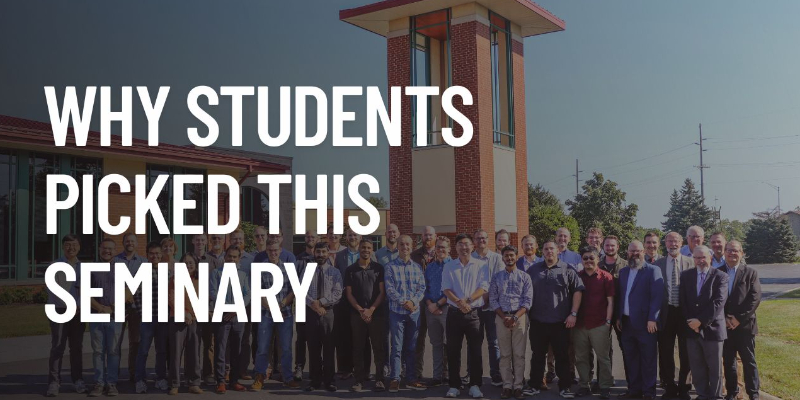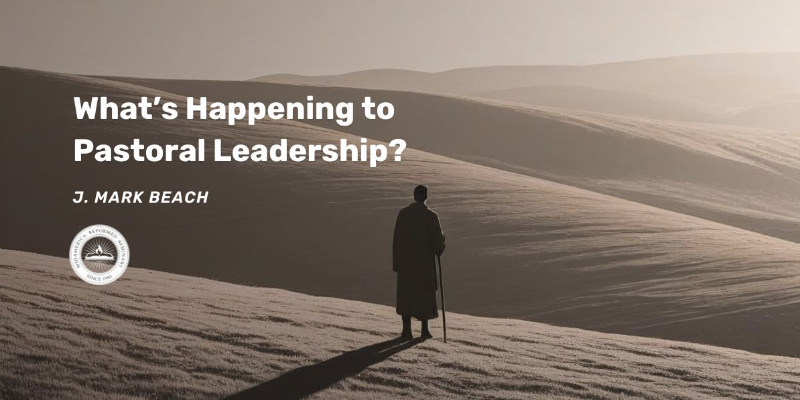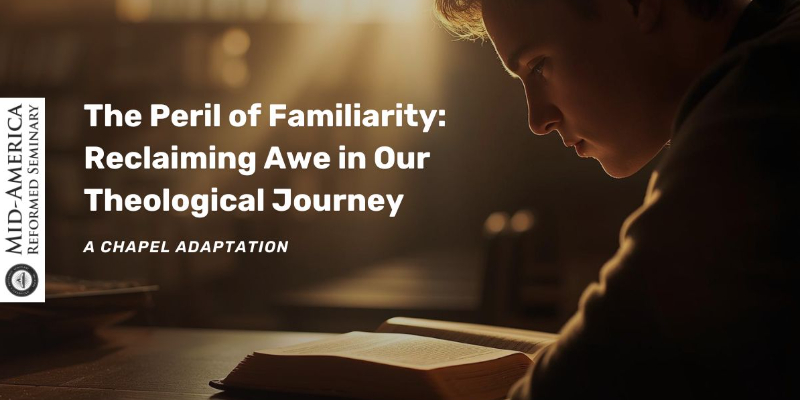
Bold as a Lion: Comments on Mark 14:43-52
This article is adapted from the December 2022 issue of The Messenger.
How do scared little lambs become as bold as lions? Mark 14:43-52 gives us a beautiful insight into not only what it is that makes us sometimes fearful before the world, but what it is that makes the church bold for Christ instead. To fully comprehend this passage, we will begin with the rather cryptic ending—Mark’s description of a young man standing alone in the Garden of Gethsemane. Not much is said about him besides that he appears to be alone and fleeing. What we are told about him is odd— he is naked and ashamed. He is likely one of the disciples of Jesus, but he is un-named. As the betrayers enter the garden to arrest Jesus, fear seems to have overtaken him, and now he finds himself fleeing frantically, alone, in the cold dark of night. What can save this fearful young man? Only love—the love of God. And as with him, so also with us. We will return to this fleeing young man shortly.
Sin is not only powerful but also deceptive; its power to deceive is perhaps nowhere more painfully felt than in the Garden of Gethsemane, the night that Jesus is betrayed. This passage takes us to what has been going on ‘behind the scenes.’ Jesus has been praying in the Garden while his disciples struggle to stay awake. Eventually, they cease their struggle in the deep of the night, and they are fast asleep. But while they are sleeping, servants of the Serpent slither in. “Immediately,” as Mark describes, as though right on the heels of Jesus’ time in prayer, an armed mob appears to arrest him. They are donned with swords and clubs. Like a small militia ready for war, they are “armed to the teeth,” as the cliché goes. This is no flash mob like we have so often seen on T.V., rioting, and looting on impulse without a moment’s notice. Rather, this mob has come on a singular mission—they have come for Jesus.
Satan has been working through Judas. The power of darkness has come in like a flood of malice and deception. Judas has been hard at work behind the scenes. With craft and cunning, he conspired with the chief priests of Israel to take Jesus by force. John 13:30 tells us that Judas had gone to them to make final preparations for His betrayal. Mark 14:10 shows us this plan had been slow-cooking in the darkness for a while. What had happened to chief priests to bring them to this point? Throughout the gospels, we learn two things about the chief priests: they misunderstood the kingdom of God, and they misunderstood Jesus. Their understanding of the kingdom was very earthly and political. Their hope was that they would retain their earthly power. Thus, it is no surprise that they came against Jesus with earthly weapons, almost as though they were expecting Jesus to fight back with similar earthly weapons. But they were wrong; Jesus was not of this world, and neither was His kingdom. He would not fight against them on their terms. His army is a host of angels, but even they have been restrained from engaging in this conflict. His Father in heaven was the greatest power behind Jesus, yet even the Father would not protect Him from what must be. The chief priests, Judas, Satan—all the dark forces of this world would have their moment of apparent victory. Darkness would appear to win—but only for the moment—only while it is the dark “hour” for which Jesus has come.
Perhaps we should also wonder, what happened to Judas? His role in this is even more puzzling than that of the chief priests. Judas was one of the twelve disciples of Jesus. How does a disciple of Jesus turn into one of his betrayers? How could His friend become His enemy? Judas walked with Jesus, talked with Jesus, ate with Jesus, and reclined with Jesus. Jesus even warned Judas during the Passover that Judas was about to do the unthinkable—he would betray Jesus unto death. And Judas still follows through despite being warned. How could it be so? Sin has a masterful way of deceiving us. Judas had been the money handler for the twelve. Love of money is a “root of all kinds of evil,” and such evil had taken deep root in Judas’ heart. Elsewhere we learned that Judas had been stealing from Jesus and the twelve. In a certain sense, Judas was already betraying Jesus well before this fateful night. But sin has a way of forcing our hand. Either we will repent of our sins and forsake them, or we will surrender to our sins and forsake Jesus. Judas took the latter road, the broad road that leads to destruction. Many are on it, and none of them are safe. It looks soft and easy, but it is riddled with thorns and thistles. It makes many promises but always takes more than it gives. Judas takes the money. He buys the lies that money and power so often make. But in the end, he dies powerless and penniless, deceived by the wages of sin.
Another notable powerful force in the Garden is the power of fear. The chief priests come to arrest Jesus with swords and clubs. Why? Because they are afraid—afraid of Jesus. The word “robber” in verse 48 is sometimes used for an insurrectionist, a person who leads a revolt by force. The irony they cannot see, Jesus does. He has not come to overturn the world by force or by stealth—they have. He has not come with a band of rebels carrying swords and clubs—they have. They have come against Jesus looking tough, but they are actually rather afraid. The world hates the name of Jesus but also fears it. His name implies power and presence, surrender, and lordship. This is why the world always seems agitated when the name of Jesus is mentioned. But it is not just the chief priests who are afraid. Jesus’ own disciples are also cowering in fear. Verse five is a very sad commentary on the disciples: “they all left him and fled.” Sin may deceive, but fear inspires, and it inspires us to self-preservation. Most of us can run our fastest when we are being chased by something we fear. One of the disciples draws his sword in a pitiful moment of fleeting bravery, but this is not the way of the kingdom. Jesus will not fight back with earthly weapons, and when the disciples realize that Jesus will indeed be carried off, they flee into the dark, cold night. Each and every one of them flees.
Where did the lions go? What happened to all their bold promises? Where is Peter, who said, “Even if I must die with you, I will not deny you”? Where are the rest of the twelve, who each affirmed the very same statement—to a man? They were ready to die with Jesus a moment ago, and now, in His hour of need, they all abandon Him and literally run for their lives. Jesus is left alone in the Garden of Gethsemane, all alone in the darkness of night. Only His betrayers and an angry mob are there. This is sin’s dark night, not just the dark night of the soul, but the dark night of human depravity. Yet off in the distance, a young man follows them into the night.
It would be easy to skip over the reference in verses 51-52 to this young man as being too brief or cryptic to be of any value. Very little is said, so little that it almost seems out of place. But it may be very important for us to consider. The young man is wearing a linen garment, a likely sign of wealth. We know from Acts 12:12 that Mark, the author of this Gospel, was from a wealthy family. The inclusion here of verses 51-52 is so brief and cryptic that many commentators suggest that this is Mark’s way of referring to himself. If it is Mark, it tells us a lot about him and the purpose of his gospel. The gospel of Mark was written to a young church in Rome that was beginning to experience the outer bands of persecution. They were being tested and tried and were tempted to fall back—to flee. The gospel of Mark ends on the note that the disciples, not yet comprehending the power of the Spirit and the resurrection of Jesus, were still afraid and were seized with fear. Mark was one of those disciples. He, too, had been gripped by fear. He, too, had broken his promises to Jesus to remain faithful unto death. He had learned firsthand how powerful and deceptive sin can be. And where did it leave him? Standing alone in the garden, naked and ashamed.
If this is Mark, it all makes sense. Mark is showing us a portrait of himself, overcome by fear and faithlessness, overcome by sin and weakness. So how does this scared little lamb later become bold as a lion? What power is there in this world so strong that it turns darkness to light and casts out fear? It is the power of love, particularly the love of Jesus.
Love is a powerful thing. They say it can move mountains and weather storms. It makes people do crazy things. And it can be used for betrayal. It is a tragic irony that Judas should betray Jesus with a kiss. A kiss is a sign of devotion and love. In many countries, it is still a common sign of friendship. In the Bible, it was not only a sign of love but friendship and loyalty. It is as though Judas were falsely saying, “I love you” to Jesus at the very moment he sealed his fate with a kiss. Jesus responds, not with swords and clubs but with the sword of the Spirit—the word of God. The scriptures must be fulfilled. The plan of God must be fulfilled. The love of the Father that compelled Him to send Jesus into the world cannot fail, and the love of Jesus that carries Him to the end of the Father’s mission will not fail. Jesus loves the Father and those for whom He came to give His life. He loves His frail, frightened disciples, now cowering in the dark of night. He loves Peter, whose blustery promises have fallen flat time and time again, and He loves Mark, who, like a scared little boy, is trying to run home naked. Jesus loves His church, not because we are strong in ourselves but because we are strong in Him and in the power of His love. What overcomes the power of fear and deception? It is the love of God. The love of God is stronger than the sin of man and even the powers of hell.
Many large cathedrals depict the disciples up high in the ceiling or on stained glass. It is interesting that some of them are pictured as animals—and that Mark, of all the disciples—should be the one depicted as a lion. Mark, the likely scared little boy standing alone in the dark, naked and ashamed. Yet, in many ways, it is rather fitting. Mark writes to a church with whom he can relate. He, too, knew the powers of fear and deception. But he had also come to know the love of God that drives out fear and inspires gospel confidence. Not man-made confidence, but confidence in God's love and the gospel's power. God's love inspires the church…and makes us as bold as a lion.

Dr. Eric Watkins serves as the Instructor of Ministerial Studies and the Director of the Center for Missions and Evangelism.
Recent articles




